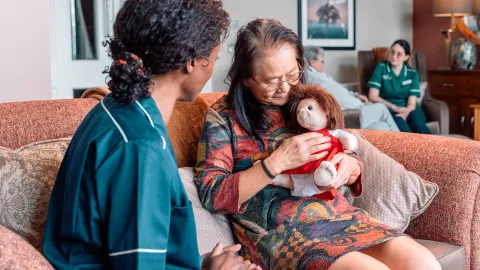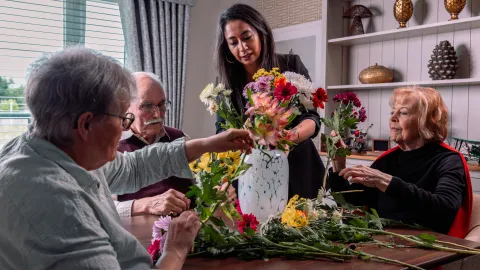
How to protect the elderly from scams
While anyone can become susceptible to scams, the elderly are the most vulnerable. Now more than ever, technological advances and financial schemes are far more sophisticated, making it easier for scammers to gain access to large amounts of money and personal information almost instantly. Older people who are less tech-savvy or not clued-up on how to avoid online scams will find it harder to detect what's legitimate and what's not, leading them to be at higher risk of being exploited.
According to a report by Age UK, 45% of people aged 65+ believe they have been targeted by scammers at some point - highlighting the need to protect and teach the elderly how to avoid being scammed. In this article, we’ll delve into the different types of scams that older people should be aware of, scam prevention and what to do if you’re worried a loved one is a victim of a scam.
The different types of scams used on the elderly
Being aware of the different types of scams is the first step in scam prevention. Here is a list of the most common types:
- Phone scams - an unsolicited call from someone pretending to be someone they’re not. This type of scam against the elderly often relies on pretending it’s an authority figure they trust, like the police, a representative from the bank or HMRC.
- Romance scams - preying on the loneliness many older people experience, sweetheart scams often start online and flatter the recipient into handing over large amounts of money.
- Text scams - similar to phone scams, these fraudulent texts often claim to be from someone trustworthy. They tend to ask for information relating to payment, subscription or delivery and warn of adverse consequences if the recipient doesn’t take action.
- Postal scams - fraudulent letters can look very professional but tend to offer prizes, unclaimed compensation or inheritance, or claim to be unpaid bills.
- Social media scams - the grandparent scam is common on social platforms, with fraudsters claiming a grandchild is in trouble and needs immediate help.
- Email scams - often containing fraudulent links, phishing emails aim to collect personal data and credit card information.
Ways to help the elderly from being scammed
Here are some practical steps you can take to help the elderly on how to avoid being scammed:
- Set up online security software – make sure all their connected devices have reputable anti-scam software installed and updated when needed. It's best to opt for one that blocks online scams, malicious links and websites.
- Teach them to be sceptical and not to act quickly: If something is too good to be true, it probably is. Remind them that they don’t need to rush; scammers often create a sense of urgency, so they make a decision without much thought. Encourage them to question any unexpected offers of prizes or let them know they can consult with you before sending any money from an unsolicited call or email.
- Use a call screening service for the elderly – this gives your loved one an extra layer of protection when using their phones. This blocks any suspicious or unwanted calls, ensuring they only answer legitimate calls.
- Tell them not to give out money until they discuss it with someone they trust – Let them know that they can consult you, a family member or trusted advisor before going through any financial choices, as scammers like to promise fake opportunities that need immediate payment, potentially leaving them with lost savings.
- Ensure they don’t open emails or attachments from unknown people – scammers often use fake emails to trick people into giving away their personal information or downloading harmful software. Make sure to avoid clicking on these emails or delete them.
How people with dementia are vulnerable to scams
Whilst the elderly are the most vulnerable to scams, people living with dementia are at even higher risk because of their reduced mental capacity. Their impaired judgment and difficulties with decision-making mean they will struggle to detect scams or risks. Memory loss makes it easy for them to not remember conversations or payments they’ve made - scammers prey on this by repeatedly targeting them in the future by setting up systems such as direct debits and subscriptions.
Challenges with managing money and being less tech-savvy increase the likelihood of falling victim to phishing emails, fake calls or fraudulent transactions, as it's harder for them to spot what's legitimate and what's not.
Elderly scams can be devastating, and it's vital you regularly remind your loved one to be aware of them. Placing short written reminders on ‘how to avoid getting scammed’ by their phone or computer can save your loved one from falling victim to a scam.
What are the signs that someone has been scammed?
Sometimes, it can be obvious when something isn’t right. But sometimes, it's not as obvious. Here are the warning signs of a scam:
- Unusual transactions from their bank account
- Unauthorised withdrawals or charges on their bank account
- Receiving more correspondence, e.g. receiving more letters than usual
- Difficulty accessing accounts that have been compromised
- Change in behaviour such as anxiety around answering the door, reluctance to speak about what they are going through
What to do if an elderly relative has become a victim of a scam or fraud
Inevitably, these types of deceitful experiences can leave your loved one feeling shameful and fearful. It's important to be as compassionate as possible. Remind them that they’re not alone and it's not their fault. Taking action right away by reporting and seeking support will help to minimise the impact of the fraud and prevent them from falling into further scams.
How do I report online scams?
Helping the elderly report online scams should be the next step in arming them against any future scams. Collect all details about the scam to build a case, including all correspondence, emails, texts or any money transactions that have been carried out. Guide them to report to the police or trusted organisations such as Action Fraud – the UK’s national reporting centre for fraud and cybercrime. If money withdrawals were made, you should contact their bank to secure their accounts and recover their funds.
Can I seek support from my local service?
The government has listed internet scams, postal scams and doorstep crime as forms of financial abuse. If you're worried that your loved one has been impacted by a scam, you can seek support from the local council’s adult social services department. They'll carry out safeguarding enquiries and put measures in place to ensure your loved one is protected, as scammers typically reinvent themselves in new ways.
Explore resources and support for looking after elderly relatives
There's a range of non-profit organisations or senior advocacy groups that you can seek care and support from, such as Action Fraud, Victim Support and Citizens Advice. They offer resources, counselling and legal assistance for scam victims.


